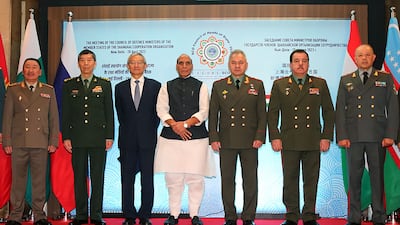India’s Defence Minister Rajnath Singh on Friday spoke of regional security challenges and counter-terrorism measures during a meeting of the Shanghai Co-operation Organisation.
The intergovernmental security and economy bloc was formed in 2001 by Russia, China, and former Soviet states in Central Asia to promote stability in the region and counter western influence from groups such as Nato.
It was expanded to include Pakistan and India, which is hosting this year’s meeting of SCO defence ministers in New Delhi.
Other defence ministers who attended the meeting were Li Shangfu of China, Russia's Sergei Shoigu, Tajikistan’s Sherali Mirzo, Iran’s Mohammad Reza Ashtiyani and Kazakhstan’s Ruslan Zhaksylykov.
Malik Ahmad Khan, special assistant to the Pakistani prime minister on defence, attended the SCO meeting on behalf of Defence Minister Khawaja Asif.
“To ensure a secure, stable and prosperous region, we need to focus on our agenda. This will help in improving the quality of life of the people of each member country. I myself am willing to discuss these issues with you,” Mr Singh said.
“We should unitedly fight terrorism. If the SCO is to emerge stronger, we have to fight together. Terror groups are using new methods like social media and crowdfunding,” he said.
Mr Singh held separate talks with his counterparts on the sidelines of the SCO meeting on Thursday, including with Mr Li, the first Chinese Defence Minister to visit India since the deadly clashes between their troops along a disputed border in 2020.
At least 20 Indian soldiers and four Chinese soldiers were killed in the fighting, which led to a freeze in diplomatic ties between New Delhi and Beijing.
The nuclear-armed nations share a 4,000-kilometre border that crosses the Himalayas from Ladakh in the north to Sikkim and Arunachal Pradesh in the east, known as the Line of Actual Control (LAC).
During his meeting with Mr Li, the Indian Defence Minister said the development of relations between the nuclear-armed neighbours is “premised on prevalence of peace and tranquillity” at the borders.
Mr Singh said breaches of existing agreements had “eroded” bilateral relations and that all border issues needed to be resolved in accordance with existing bilateral agreements and commitments.
He discussed the International North-South Transport Corridor in talks with Iran's Gen Ashtiyani.
The 7,200-kilometre corridor includes ship, rail and road transport for moving freight and passes through India, Iran, Azerbaijan, Central Asia and Russia.
The corridor aims to improve trade connectivity between major cities such as Mumbai, Moscow, Tehran, Baku, Bandar Abbas, Astrakhan and Bandar Anzali.


